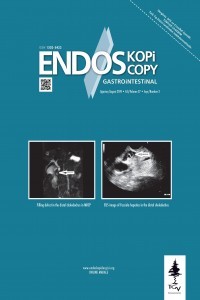Mide kanserli hastalarda adjuvan kemoradyoterapi: Tek merkez deneyimi
Mide kanseri, kemoradyoterapi, sağkalım, prognoz
Adjuvant chemoradiotherapy in patients with gastric cancer: Single-center experience
Gastric cancer, chemoradiotherapy, survival, prognosis,
___
- Jemal A, Siegel R, Xu J, Ward E. Cancer statistics, 2010. CA Cancer J Clin 2010;60:277-300.
- Dicken BJ, Bigam DL, Cass C, et al. Gastric adenocarcinoma. Ann Surg 2005;241:27-39.
- Yilmaz HH, Yazihan N, Tunca D, et al. Cancer trends and incidence and mortality patterns in Turkey. Jpn J Clin Oncol 2010;41:10-6.
- Wanebo H, Kenedy BJ, Chmiel J, et al. Cancer of the stomach: a patients care study by the American College of surgeons. Ann Surg 1993;218:583-92.
- MacDonald JS, Smalley SR, Benedetti J, et al. Chemoradiotherapy after surgery compared with surgery alone for adenocarcinoma of the sto- mach or gastrointestinal junction. N Engl J Med 2001;345:725-30.
- http://www.nccn.org/professionals/physician_gls/pdf/gastric.pdf (erişim tarihi: 20.02.2012)
- Crew KD, Neugut Al. Epidemiology of gastric carcinoma. World J Gas- troenterol 2006;12:354-62.
- Hermans J, Bonenkamp JJ, Boon MC, et al. Adjuvant therapy after cura- tive resection for gastric cancer: meta-analysis of randomized trials. J Clin Oncol 1993;11:1441-7.
- Earl CC, Maroun JA. Adjuvantt chemotherapy after curative resection for gastric cancer in non-Asian patients: revisting a meta-analysis for rando- mized trials. Eur J Cancer 1999;36:1059-64.
- Hallisley MT, Dunn JA, Ward LC, Allum WH. The second British Sto- mach Cancer Group trial of adjuvant radiotherapy or chemoterapy in re- sectable gastric cancer: five-year follow-up. Lancet 1994;343:1309-12.
- MacDonald J, Smalley S, Benedetti J, et al. Postoperative combined radi- ation and chemotherapy improves disease-free survival (DFS) and ove- rall survival (OS) in resected adenocarcinoma of the stomach and gastro- esophageal junction. Update od the results of Intergroup Study INT- 0116 (SWOG 9008) [abstract]. Proc Am Soc Clin Oncol 2005:106.
- Kim S, Lim DH, Lee J, et al. An observational study suggesting clinical benefit for adjuvantt postoperative chemoradiation in a population of over 500 cases after gastric resection with D2 nodal dissection for ade- nocarcinoma of stomach. Int J Radiat Oncol Biol Phys 2005;63:1279-85.
- Okajima K. Prognostic factors of gastric cancer patients a study by uni- variate analysis (in Japanese, with English abstract). Jpn J Gastroenterol Surg 1997;30:700-11.
- Hochwald SN, Kim S, Klimstra DS, et al. Analysis of 154 actual 5-year survivors of gastric cancer. J Gastrointest Surg 2000;4:520-5.
- Gunji Y, Suzuki T, Hori S, et al. Prognostic significance of the number of metastatic lymph nodes in early gastric cancer. Dig Surg 2003;20:148-53.
- Marchet A, Mocellin S, Ambrosi A, et al. Italian Research Group for Gas- tric Cancer (IRGGC). The ratio between metastatic and examined lymph nodes (N ratio) is an independent prognostic factor in gastric cancer re- gardless of the type of lymphadenectomy: Results from an Italian multi- centric study in 1853 patients. Ann Surg 2007;245:543-52.
- ISSN: 1302-5422
- Başlangıç: 2010
- Yayıncı: Türk Gastroenteroloji Vakfı
Mide kanserli hastalarda adjuvan kemoradyoterapi: Tek merkez deneyimi
Birsen YÜCEL, Ebru Atasever AKKAŞ, Yıllar OKUR, Nalan BABACAN, Mehmet Fuat EREN, Turgut KAÇAN, Saadettin KILIÇKAP
Gastrik nöroendokrin tümörün keple mukozektomi yapılarak çıkarılması
Meltem ERGÜN, Fatih Oğuz ÖNDER, Nesrin TURHAN, Ertuğrul KAYAÇETİN
Müjde SOYTÜRK, Seda Akkaya ÖZDİNÇ, Sülen SARIOĞLU, Özgül SAĞOL, Gözde Derviş HAKİM, Ömer TOPALAK
Özofagusta geç dönemde saptanarak endoskopik olarak çıkarılan yabancı cisim
Bilal ERGÜL, Levent FİLİK, Zeynal DOĞAN, İbrahim BIYIKOĞLU
İlhan DOLAŞIK, Hakan UZUNOĞLU, Selman ÇINAR, Selçuk Yusuf ŞENER, Mehmet Zeki AYDIN, Koray ÇELEBİ, Ömer ŞENTÜRK, Sadettin HÜLAGU
Akut pankreatit ile başvuran bir duodenal duplikasyon kisti olgusu
Atakan COMBA, Gönül ÇALTEPE, Ayhan Gazi KALAYCI, Özlem KIRMEMİŞ, Mehmet KEFELİ, M. Selim NURAL, Mithat GÜNAYDIN, Filiz KARAGÖZ, Rıza RIZALAR
Ortotopik karaciğer transplantasyonu sonrası biliyer stenoz için tam kaplı metal stentler
Üst gastrointestinal mukozayı değerlendirmede endoskopistler ve patologlar ne kadar uyumludur?
Elmas KASAP, Gökçen GÜNGÖR, Emine AYGÖR, Özlem Suade BADAK, Semin AYHAN, Hakan YÜCEYAR
Serum D-dimer düzeyi mide kanserli hastalarda sağkalım için prognostik bir faktör olabilir
Saadettin KILIÇKAP, Turgut KAÇAN, Orhan KIRBIYIK, Nalan Akgül BABACAN, Birsen YÜCEL, Mehmet Fuat EREN
